
Painfully brought to the public's attention by the genius series Blue Planet II, plastic pollution has been a hot topic this year. As bloggers, photographers and general Planet Earth enthusiasts, it's easy to present the places we love as we wish they were; to crop out the ugly parts or direct our cameras elsewhere. This collaboration is an attempt to rectify the rose-tinted vision we have often portrayed. Nowhere is left unaffected by the plastic plague.

So as not to be completely pessimistic, I asked each contributor for an idea of how we might be able to help...
Vila do Bispo/Sagres, Portugal.


Sagres is at the most south-westerly point of Portugal (and therefore Europe). The beaches in this area are spectacular and it's a great place to surf.
Clean a beach (or anywhere else).
We were travelling in our little van Burt (RIP), when a barrage of storms hit Portugal. Each tide dredged up a new wave of plastic or (more disturbingly) washed it back into the sea. In between rain, I started to collect armfuls. I prioritised the big bits of polystyrene as they break down so quickly.
Whether it's a #2minutebeachclean or afternoon's activity, the impact you are making is always a positive one. I can't think of a more easily accessible, hands-on way to get involved in ocean conservation.
This bit was just written by me (Katie).
Sumidero Canyon, Mexico.


Sumidero Canyon is a spectacular canyon that’s been carved out by the Rio Grijalva in the Mexican state of Chiapas. It’s a pristine wonderland with wildlife and lush vegetation colouring the riverbanks. Several endangered species like the Central American River Turtle and the American Crocodile call the canyon home.
This is mother nature at her best, so I was shocked to see a thick expanse of filthy pollution blocking our boat's path. It took the boat ten minutes to traverse the plastic quagmire and I don’t think it’s possible for any animals to get through.
Use a water filter.
It’s no secret that plastic water bottles are bad for the environment. The bottles float easily and travel huge distances across rivers and oceans. They are the most common form of pollution found on our beaches and they don’t break down, so they hang around for a long, long time.
Limited access to clean drinking water can make it hard for travellers to reduce plastic waste. But instead of clogging up the environment and wasting money on bottled water you can use a portable filter instead. They are quick and convenient devices that upgrade the quality of your water wherever you go and help keep plastic bottle waste out of our lakes, streams, rivers and oceans.
Thanks to Andrew and Audrey Chalmers of Gumnuts Abroad (facebook).
Mumbai, India
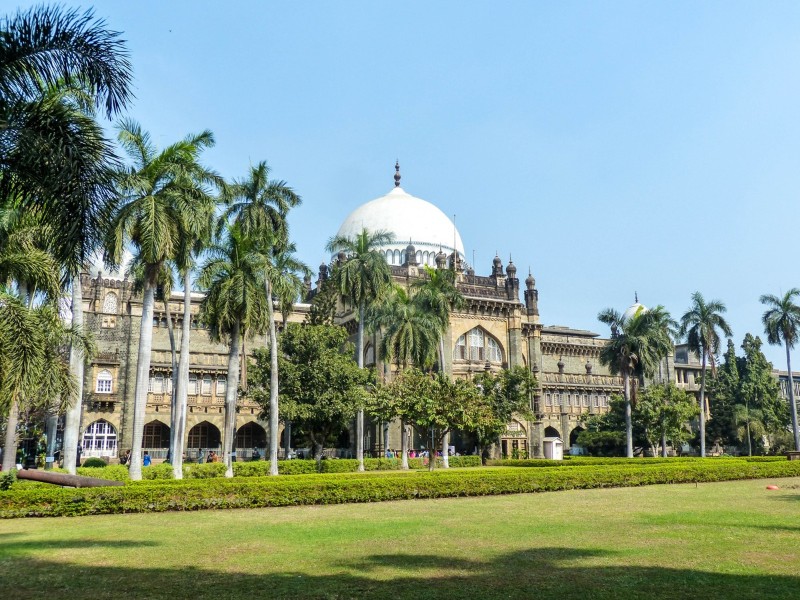
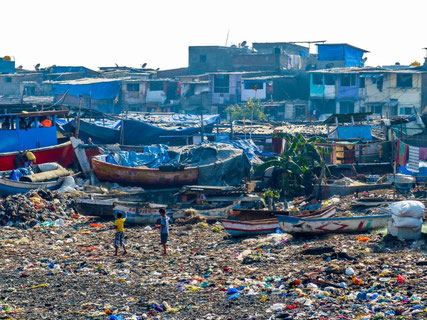
Many of the world's streets are full of trash and India is severely affected by this problem. In Mumbai, I was shocked to find some areas completely filled (even with kids playing in it), but others which looked very nice and well maintained.
Make an effort to find a bin...
If there’s one tip I can give: make the actual effort to search for a trash bin, even if you can't see it immediately and if it means you need to carry your trash for a while if necessary - just because there is already a lot of trash on the street doesn't mean that you (as a tourist) should add to it. I find myself walking around with an empty bottle of some plastic package sometimes for an hour until I finally find a trash can on the street.
A real change must come from the government and I really hope that they will establish more bins.
Thanks to Patrick Muntzinger from German Backpacker (facebook).
Isle of Islay, Scotland


Walking along the northwest coast of the beautiful Isle of Islay in June, we are miles from habitation, surrounded by wonderful sights, smells and sounds of wildlife, flora and fauna, the elements, wind and sea. Stunning, unspoiled beauty. Rare "Duke of Burgandy" butterflies are hatching, amazing!
There is another face to the landscape: colourful, ugly, destructive, a different sort of habitat for the abundant wildlife of Islay. It is the face of plastic, in every gully, along every burn, on the beaches, in the caves we cannot escape and nor can the creatures that live among it.
Teach the next generation to care too.
At last we hear there is progress, the world is listening... There have always been pockets of people who care in every walk of life, but it has taken too long and the task is enormous. We have been teaching young minds in schools for a generation and those young people now have a legacy to start clearing up the mess we've all created.
Children: it is so easy to take time to go outside, stop, sit, listen, touch, feel, draw, explore. Ask to have your birthday party outside and make mosaics with stones and shells; press flowers and leaves to make a picture. Have a treasure hunt collecting plastic to recycle and have prizes of home made treats. Please, no more balloons for animals to swallow. We can all have fun without plastic, try it!
Parents: take away the plastic bottles of fluorescent fizz, the plastic bags of sweets, use proper cups. Collect rubbish, recycle, make things, draw things, show them how the world is supposed to look. Schools can help, but it is time for parents to take responsibility as well, it is so easy... ten minutes a day, that is all you need to start an interest that can last a lifetime.
Thanks to Mary-Ann Featherstone (my Mum) - who runs The Dower House self-catering accommodation on Islay (facebook).
Fife, Scotland
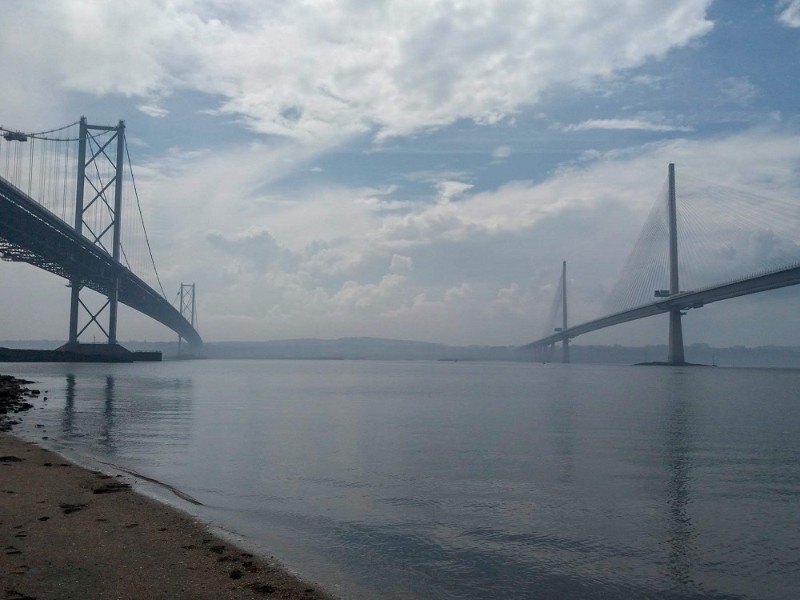

Scotland has more than 10,000 miles of coastline but sadly it’s not always in perfect condition and plastics manage to find their way onto too many otherwise idyllic beaches. This is Ferrycraigs Beach in Fife which has some pretty spectacular views over the Firth of Forth, its islands and the architectural wonders that are the Forth Bridges including the UNESCO World Heritage Site the Forth Rail Bridge. Sadly, while the view across may be stunning, the beach itself leaves much to be desired.
We recently picked this spot for a group beach clean as part of the #ShoreYouCare plastics awareness event and we were quite shocked by the amount of plastic. One of the top offenders was cotton buds sticks and they were truly everywhere you looked. The only reason these little plastic tubes actually end up here is because people don’t even dispose of them properly and chose to flush them down the toilet instead of popping them in a bin. As well as looking horrendous on our coastlines, cotton buds can cause all sorts of harm to marine habitats including poisoning or injuring wildlife.
Swap your cotton buds.
If you want to avoid the issues then changing from plastic cotton buds to something more sustainable like bamboo centred or cardboard ones is a great choice but, above all, never put these down the toilet! Biodegradable options are readily available online and at larger supermarkets and just this small change can make a big difference to our beautiful coastline, to the natural environment and to the marine wildlife that call it home!
Kirstin from The Tinberry Travels.
Phi Phi Islands, Thailand


The Phi Phi Islands, situated in south-eastern Thailand, are among the country's most famous and popular for their idyllic white sandy shores and amazing sea life. Beautiful luxury resorts to backpacker beach shacks are in abundance on Ko Phi Phi Don, the only inhabited island. Long boats, speed boat and ferries take tourists from Ko Phi Phi Don as well as Krabi and Phuket on the mainland to the various smaller islands; a true tropical paradise.
Once.
Having visited first in 2007, post-tsunami when the islands were devastated, then again in 2016, what shook us to the core was not just the amount of development that had occurred over the space of a decade, but the amount of litter washed up on the islands' shores.
We left our pristine beach resort to explore a little further to the village tucked behind our resort on the recommendation of our bar tender that we would catch the most beautiful sunsets from Loh Lana Bay on the west side. What we were met with was ankle deep litter, EVERYWHERE. You could barely even see the white sand of the beach. An effort of sorts had been made by villagers to sweep the worst of the rubbish in to piles and burn it, but the mere size of the problem even on this few hundred metre stretch of beach would take an army of volunteers a week to remove, then take it to where? There is no refuse tip on the island, it all needs to be exported at cost back to the mainland for disposal every day.
The cause of the pollution, and the fact there was such an abundance of it on the day we visited, was apparently because of heavy storms in the preceding days. Whenever currents are strong, the tide apparently brings in waste from mainland Thailand, worse than usual but it still occurs daily. So although huge efforts are made to try and remove all rubbish from Phi Phi itself by hotels and businesses, there's nothing that can be done to stop the deluge that arrives daily from elsewhere. It is, of course, removed by the private resorts but elsewhere on the island there's little that can be done, they simply lack the resources.
This is only the start of Phi Phi's issues with over-tourism and pollution. Human waste causes a huge issue as water processing facilities on the island are stretched beyond capacity and damage to the famous coral reefs caused by long boats and water temperature increases has lead to the most famous attraction Maya Bay closing temporarily to tourism boats.
Get your ice creams in an edible cone.
We have already started to instill sustainable habits in our children who have seen first-hand the devastation that plastics can cause. One thing they now insist on is getting their ice creams in cones that can be eaten completely rather than asking for plastic cups and spoons that then need disposing of. A drippier mess for sure, but a very small price to pay for the environment.
Thanks to Keri Hedrick - Our Globetrotters (facebook).
Ruaha National Park, Tanzania


We were absolutely shocked to arrive at our overnight campsite at Ruaha National Park, Tanzania. We were overlanding Tanzania with our kids and had spent the day on a fantastic self-drive safari spotting elephants, giraffe, zebras and crocodiles. Despite all this wildlife around, there were piles of plastic rubbish EVERYWHERE at the campsite! All over the fire pit, chucked in piles in the corner. It had obviously been left there for weeks. Just awful. To make it worse, the campsite was unfenced and there was a family of elephants walking around.
When visiting wild places, expect to take your rubbish home with you.
When visiting wild places, never (under any circumstances) leave of your rubbish there. Take it home and dispose of it sensibly; this means recycling if you have had to use plastic. When travelling overseas, especially to developing countries, you cannot trust that authorities will dispose of it correctly.
Thanks to Jenny from TraveLynn Family (instagram).
Koh Lipe, Thailand
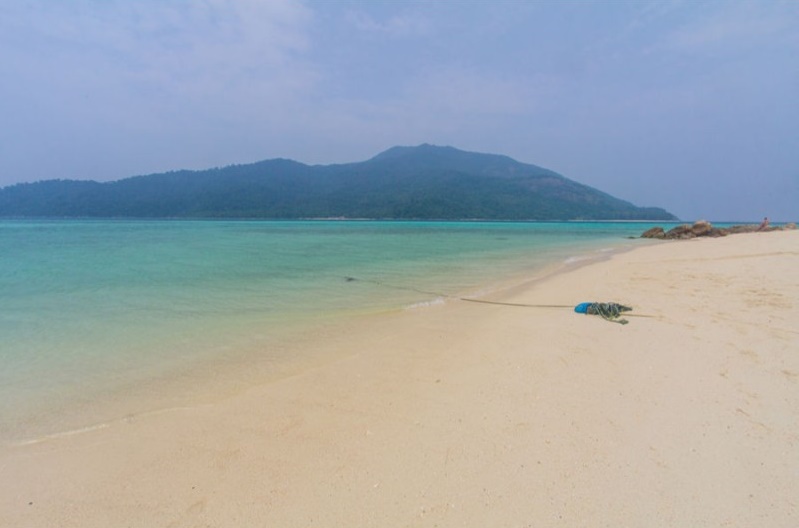

The amazing beaches on Koh Lipe, like much of Southeast Asia, are plagued with ocean trash. However, after a one hour clean up the beach is clear!
Eat in rather than take out.
Countries in Southeast Asia like Thailand make great food really accessible. With so many street vendors in the major cities, there is an endless selection of tasty dishes to eat.
Just because this food is fast, doesn’t mean it has to be takeaway. Consider that every takeaway dish requires another styrafoam container, plastic bag and plastic fork, all of which are going to have a total usable life of about 15 minutes. What a waste for a single feed.
Next time you buy the quick food, consider eating in the restaurant or at the small tables surrounding the stall. You will get a real plate, a real fork and no plastic bag. The only waste generated is a bit of dirty water. Sure, the water get poured down the drain which isn’t great, but it’s a whole lot better than inevitably adding to the plastic pollution problem that is plaguing our oceans.
Thanks to Josh from The Lost Passport (facebook).
La Libertad, El Salvador.
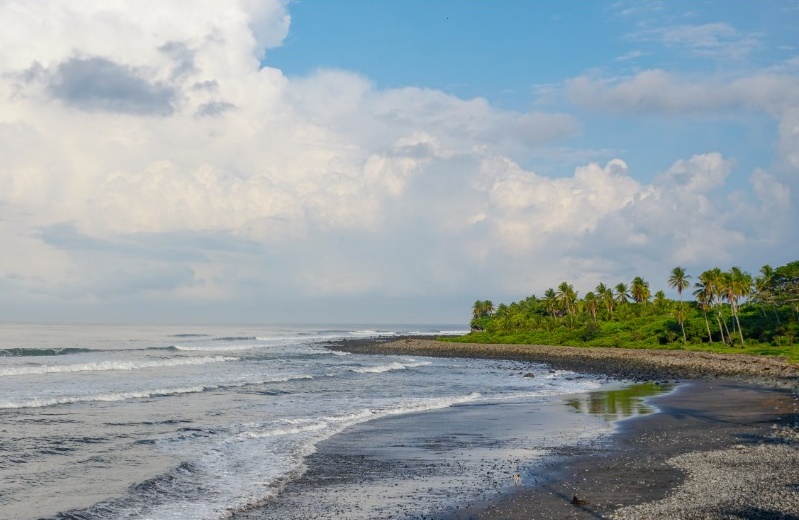
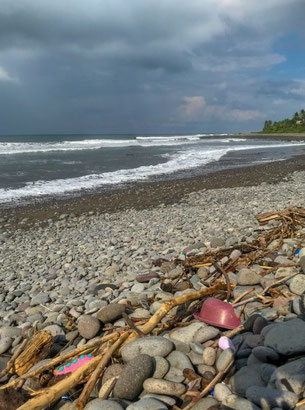
El Salvador is a surfer's paradise, but plastic waste mars its popular beaches. Although the beautiful view and the sound of waves crashing against the rocky shore makes for the perfect retreat, the rubbish underfoot threatens to ruin the setting. We easily filled two bags with litter after just a few minutes cleaning up the beach in front of our AirBnB in La Libertad.
Carry reusable cutlery.
The most common plastic culprit we found: plastic forks, spoons, and knives. Fortunately, this problem has an incredibly easy fix! Grab a set of bamboo utensils (we love ours from To-Go Ware*) and keep them in your day bag with you at all times. Why bamboo? It's a grass (which means it can be cut without killing the plant) so it's a very renewable resource, it's super sturdy and durable, and it won't hurt your budget. Next time you're getting food on the go, you can say no thanks to plastic utensils that might end up on the beach.
Thanks to Emily and Aaron from Two Dusty Travelers (instagram).
*Not a sponsored link, just a personal recommendation.
The Philippines.


As a traveller who came from the Philippines and has travelled to some parts of the world, I learned to understand the value of cooperating in reducing the usage of plastic. These pictures here which are taken in a small province in the Philippines, are literally a few hundreds metres away from each other. A foot bridge full of rubbish and a beautiful farm full of trees.
Bring a cloth bag.
I started cutting down my usage of plastic back in 2016 and got myself a couple of travel items that are reusable. One of the most useful I have is a cloth bag; I use this as a day pack when exploring but at the same time, it's my shopping bag too. I like cooking in hostels, so I visit the local market often. In Southeast Asia, they use plastic everywhere and every time - "Do you need a piece of onion? Here it is with a free plastic bag to carry it.". It's crazy! I understand that it's not easy because we are used to it, but in small steps like carrying a cloth bag that literally weighs next to nothing can make a small difference.
Such big issue as plastic pollution may not be harming you as a person directly, but the environment is suffering; animals are dying. These animals deserve to enjoy the world too, it's their world too. I almost don't use plastic bag anymore, I only have about three that I have been using for at least a year now, one where I place my shoes especially when they get wet, one for my laundry that are wet sometimes too, and another simply for emergency, but I don't buy a new one anymore or throw one away. A cloth bag can be easily cleaned and dried because most of the time they come in very thin cloth. There are a lot of other eco-friendly travel accessories and products you can use to start cutting down the use of plastic. I'm not perfectly zero-plastic-waste traveller but you can make a small changes from your small actions.
Thanks to Mary Charie from A Mary Road (facebook).
San Cristóbal, Galapagos, Ecuador

These are some amazing murals on San Cristobal island.
Stop using plastic straws.
Single use plastics such as drinking straws, are getting a lot of bad press lately for good reason. These items have a very short lifespan and quickly become garbage which will take hundreds of thousands of years to decompose. In light of this, many businesses, cities, and even whole countries are phasing out plastic straws which is an initiative that I wholeheartedly support. I am currently travelling in the Galapagos region of Ecuador where many businesses have already banned plastic straws and utensils. This is a step in the right direction as the region is home to many endangered Pacific green sea turtles that have been found with plastic straws stuck up their noses.
What happens if you just really like to use a straw? Or the place you’re travelling to doesn’t already have a straw ban in place? Then I recommend carrying a stainless steel one in your purse or backpack. They’re lightweight, portable, easy to clean, and kits can be picked up online for a few dollars. We’ve loved having our straws with us on our round-the-world adventure, and I have shared them with people who like using one but found out they were banned. The less plastic waste there is in the world, the better off we will all be. In short, straws suck!
Thanks to Thea of The Zen Travellers (instagram).
"Plastics take thousands of years to degrade."
"8 million tonnes of plastic enter the sea each year."
Aruba.
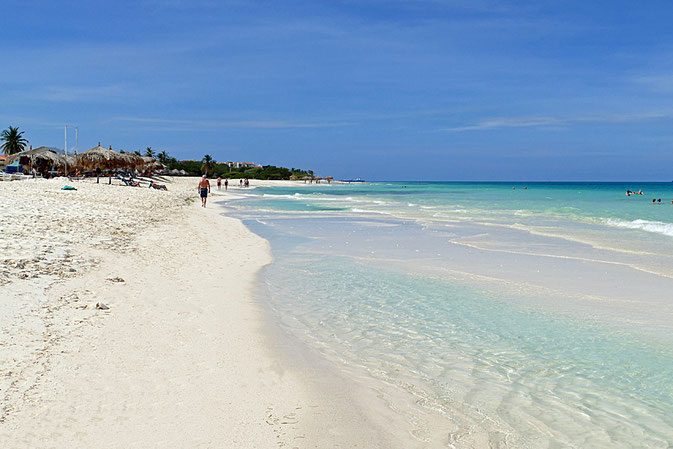

When I visited Aruba a couple of years ago, the beaches there blew me away. Picture miles of soft white sand, lapped by the clear, warm water of the Caribbean Sea. However, away from the tourist areas, where the beaches weren’t regularly cleaned, I saw a different story. Plastic bottle tops, tubs, a flip flop and ropes, washed up by a recent a storm, were all over the beach. It was heart-breaking to see, both to know that all that rubbish is in our oceans and to see such an island paradise ruined.
Buy your vegetables from small green-grocers or farmers' markets.
More recently, just yesterday in fact, when I went to the supermarket, one of the big chains, I looked around the salad section and noticed how everything came in a non-recyclable plastic bags or tubs. Salad leaves, baby spinach, watercress, celery, rocket… all of it was in plastic. The only thing that wasn’t were the spring onions, but they alone would make a dreadful salad! Then I thought back to my local grocers, an independent shop in the town centre where almost nothing came in plastic. It’s gone now, but if more people had supported it, it might still be there, and I’d be able to buy items for a salad that weren’t wrapped in plastic. I’m determined to find another store where I can buy my salad plastic free.
Thanks to Kathryn of Sussex Bloggers (instagram).
Hormuz, Iran
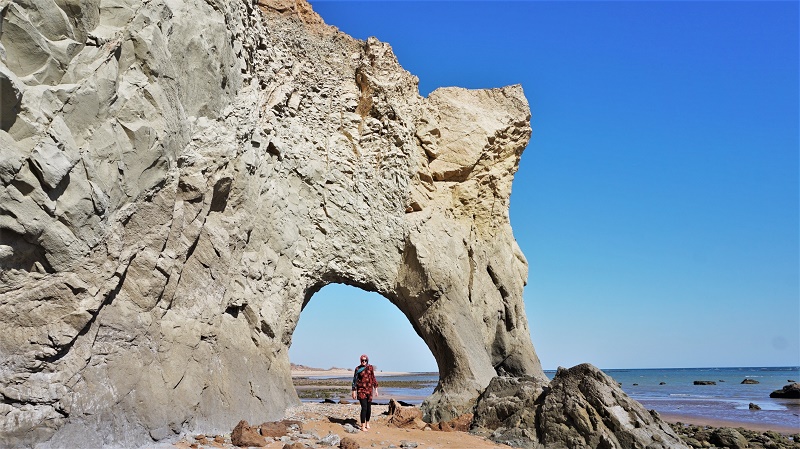

This photo is taken on the magical island of Hormuz in the Persian Gulf, famous for its rainbow sands and geological sites.
Switch to solid toiletries.
A great way to reduce plastic waste is to switch to solid toiletries. There are lots of options on offer these days and you can now use shampoo, conditioner, soap, moisturiser and facewash without using any plastic packaging. Most brands are made from organic ingredients and are cruelty-free making them the perfect eco-friendly choice. Solid toiletries are also great for travel as they can be taken in hand-luggage and they last much longer than bottled toiletries. Having your own products also means you don't need to use the little plastic shampoo bottles provided by hotels which are oh-so-cute but a huge waste of plastic!
Thanks to Rohan from Travels of a Bookpacker (instagram).
If we all work together, maybe we can make a difference!
For reasons to protect our oceans and ideas of how to do so, you might like to read my previous post.

